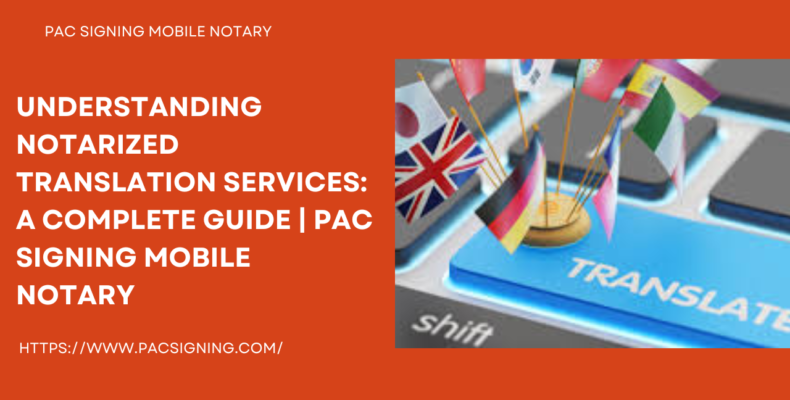Certified Notarized translation services play a crucial role in ensuring the authenticity and legality of translated documents, especially in legal, academic, and business contexts. A notarized translation is a translation of a document that has been certified as accurate and complete by a professional translator and subsequently notarized by a notary public. This process adds an extra layer of credibility and official recognition to the translated document, making it legally valid and acceptable in various official and international settings.
The primary purpose of notarized translation is to provide legal validity and official recognition to translated documents, ensuring that they can be accepted as authentic and legally binding in official and international settings. Notarized translations are often required for various legal, academic, and business purposes, such as immigration applications, court proceedings, academic admissions, and international contracts.
The requirements for notarized translation may vary depending on the jurisdiction and the specific document involved. However, in general, notarized translation requires the following steps:
- Translation of the document by a professional translator proficient in both the source and target languages.
- Certification of the translation by the translator, who attests to its accuracy and completeness.
- Notarization of the translated document by a notary public, who verifies the identity of the translator and confirms the authenticity of the translation with an official seal and signature.
A notarized translation: what is it?
A notarized translation is a specialized type of translation service that provides an added layer of authentication and legal validity to translated documents. In essence, it involves the translation of a document from one language to another by a professional translator, followed by certification of the accuracy and completeness of the translation by the translator themselves. Subsequently, the translated document is presented to a notary public, who verifies the identity of the translator and attests to the authenticity of the translation with an official seal and signature.
It’s crucial for notaries to familiarize themselves with the specific rules and regulations governing their jurisdiction to ensure compliance with ethical standards and legal requirements. Adhering to these rules helps maintain the credibility and effectiveness of notarial acts, ultimately serving the public interest.One of the key benefits of notarized translation is its international recognition. Notarized translations are widely accepted in various countries and jurisdictions, making them suitable for use in cross-border transactions, legal proceedings, academic admissions, and other official matters involving parties from different linguistic backgrounds.
How is a translation notarized?
- Translation by a Professional Translator: The first step is to translate the document from its original language into the desired target language. This translation is typically carried out by a professional translator who is proficient in both languages and has expertise in the subject matter of the document.
- Certification by the Translator: Once the translation is complete, the translator certifies the accuracy and completeness of the translation by signing a statement of accuracy. This statement attests that the translation is a true and faithful representation of the original document.
- Presentation to a Notary Public: The translated document, along with the certification statement signed by the translator, is then presented to a notary public. The notary public is a public official authorized to witness and certify legal documents.
- Verification of Identity and Authenticity: The Pac Signing Mobile Notary Public verifies the identity of the translator and confirms the authenticity of the translation. This may involve checking the translator’s credentials and comparing the translated document with the original to ensure accuracy.
- Notarization: Once satisfied with the identity of the translator and the accuracy of the translation, the notary public notarized the document by affixing an official seal and signature. This seal and signature serve as an official endorsement of the authenticity and legality of the translation.
- Issuance of Notarized Document: After notarization, the translated document is returned to the requester, now bearing the notary public’s seal and signature. This notarized document is considered legally valid and can be used for various official purposes, such as immigration applications, court proceedings, academic admissions, and international contracts.
What is a Notary Public?
Notaries Public play a crucial role in preventing fraud and ensuring the integrity of legal transactions by verifying the identity of the parties involved and certifying the authenticity of the documents being signed. They are typically authorized to perform various duties, including:
- Acknowledgments: Notaries Public can witness the signing of documents and verify the identity of the signatories. They then affix their official seal and signature to the document to certify that the signatures are genuine.
- Jurats: In cases where an individual is required to make a sworn statement or affidavit, a Notary Public can administer an oath or affirmation to the individual, certifying that the statement is true and accurate.
- Certifying Copies: Notaries Public can also certify copies of original documents, such as birth certificates, passports, and academic transcripts. This involves comparing the copy to the original document and certifying that it is a true and accurate reproduction.
- Witnessing Signatures: Notaries Public may witness the signing of contracts, wills, deeds, powers of attorney, and other legal documents to ensure that all parties understand the contents of the document and are signing voluntarily.
When are notarized translation services necessary?
Notarized translation services are necessary in various situations where translated documents require legal validity, official recognition, and acceptance in official and international settings. Here are some common scenarios where notarized translation services may be required:
- Legal Documents: Legal documents such as contracts, affidavits, court orders, and immigration forms often require notarized translations to ensure their authenticity and legality. These documents may be submitted to government agencies, courts, or other authorities, where notarized translations are necessary to demonstrate compliance with legal requirements.
- Academic Records: Academic transcripts, diplomas, degrees, and other educational documents may need notarized translations for admissions to educational institutions or professional certification purposes. Notarized translations provide assurance that the academic credentials of an individual are accurately represented and recognized internationally.
- Business Contracts: Business contracts, agreements, licenses, financial statements, and other commercial documents may require notarized translations for cross-border transactions, international partnerships, or legal compliance purposes. Notarized translations help ensure that contractual obligations are clearly understood and legally enforceable in different jurisdictions.
- Immigration Applications: Immigration documents such as passports, birth certificates, marriage certificates, and police clearances often require notarized translations for visa applications, residency permits, or citizenship processes. Notarized translations help immigration authorities verify the authenticity of the documents and assess the eligibility of applicants for immigration benefits.
- Court Proceedings: Documents submitted as evidence in court proceedings, including witness statements, expert reports, and legal pleadings, may need notarized translations for judicial review and admissibility. Notarized translations help ensure that all parties involved in the legal process have access to accurate and reliable translations of essential documents.
- International Contracts: Contracts and agreements negotiated between parties from different linguistic and cultural backgrounds may require notarized translations to ensure mutual understanding and enforceability. Notarized translations help mitigate language barriers and facilitate effective communication between parties, reducing the risk of misunderstandings or disputes.
Are notarized translations required for immigration purposes?
Yes, notarized translations are often required for immigration purposes, especially when submitting documents to immigration authorities for visa applications, residency permits, or citizenship processes. Immigration documents such as passports, birth certificates, marriage certificates, police clearances, educational diplomas, and employment records may need to be translated into the official language of the destination country.Notarized translations provide assurance to immigration authorities that the translated documents are accurate, complete, and legally valid. They help verify the authenticity of the documents and ensure that they meet the language requirements specified by immigration regulations.
Common Misconceptions about Notarized Translation
Despite its importance and widespread use, notarized translation is often subject to misconceptions. Some common misconceptions include:
- Not Required for All Documents: Notarized translation is not required for every document, but it is necessary for certain types of legal, academic, and business documents, especially those intended for official or international use.
- Not the Same as Certified Translation: While notarized translation and certified translation are often used interchangeably, they are not the same. Notarized translation involves both translation and notarization, while certified translation only involves translation certified by a professional translator.
Faq’s:
What is the difference between Notarized and Certified Translation?
Notarized translation involves both translation and notarization by a notary public, ensuring the accuracy and authenticity of the translation. On the other hand, certified translation refers to translation that is certified by a professional translator as accurate and complete. While both types of translations serve similar purposes, notarized translations carry an additional level of legal validation through notarization.
Are Notarized Translations always accepted internationally?
While notarized translations are widely accepted internationally, acceptance may vary depending on the specific requirements of the receiving institution or authority. It’s essential to verify the specific language and documentation requirements of the intended recipient before obtaining a notarized translation to ensure its acceptance.
How long does it take to get a document Notarized and Translated?
The time required to obtain a notarized translation depends on various factors, including the length and complexity of the document, the availability of the translation service provider and notary public, and any additional requirements or processing times. Typically, the process can take anywhere from a few days to a few weeks, depending on these factors.
Do I need to provide the original documents for Notarized Translation?
Yes, original documents are usually required for notarized translation to ensure the accuracy and authenticity of the translation. The translator will need to review the original documents to produce an accurate translation, and the notary public may also need to verify the authenticity of the originals before notarizing the translation.
Can I Notarize and Translate my own documents?
In most cases, individuals are not allowed to notarize and translate their own documents due to conflict of interest and ethical considerations. Notarized translations require an impartial third party, such as a professional translator and a notary public, to ensure the accuracy and legality of the translation. Attempting to notarize and translate one’s own documents may compromise the integrity and validity of the translation.

